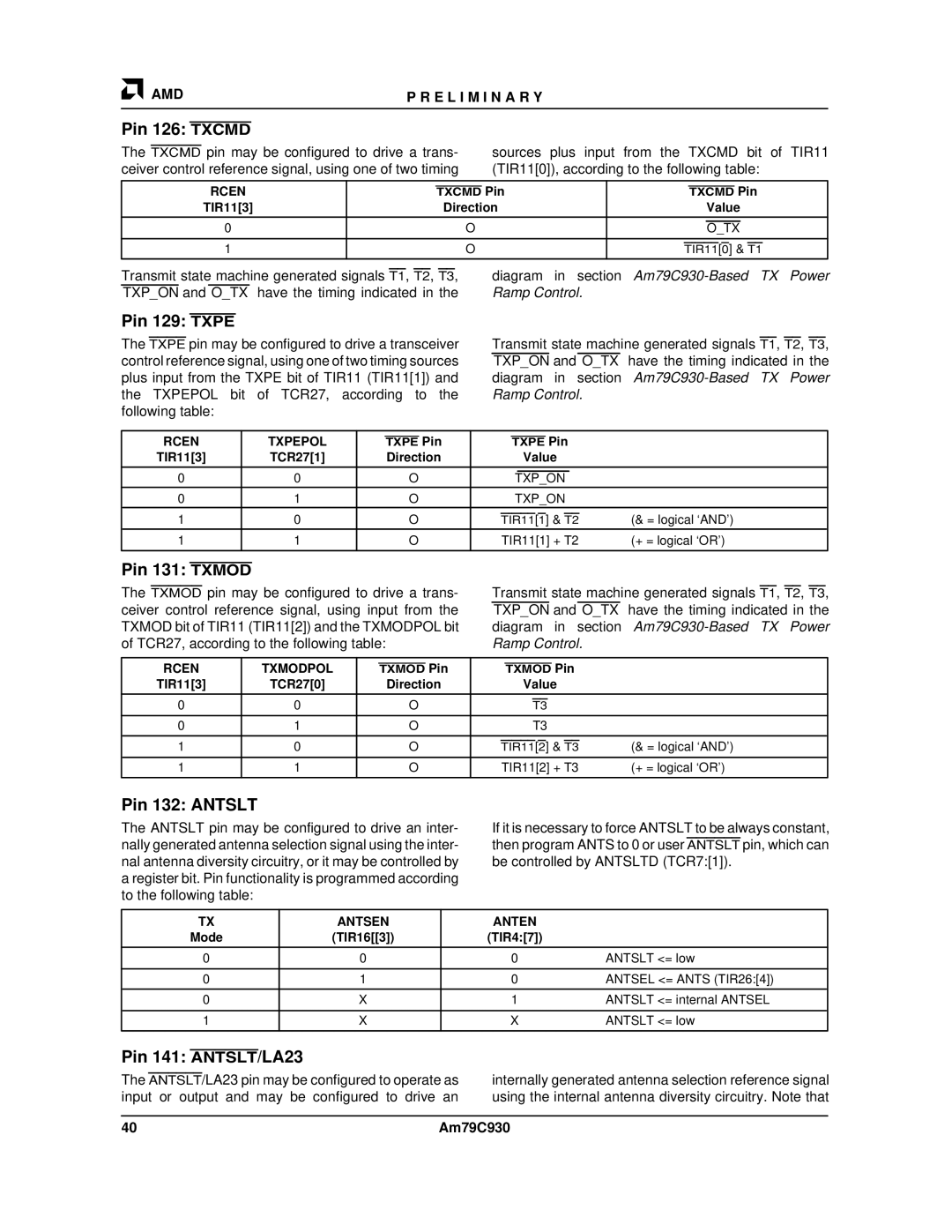
AMD | P R E L I M I N A R Y |
|
|
Pin 126: TXCMD
The TXCMD pin may be configured to drive a trans- ceiver control reference signal, using one of two timing
sources plus input from the TXCMD bit of TIR11 (TIR11[0]), according to the following table:
|
| RCEN |
| TXCMD Pin |
| TXCMD Pin | ||||
| TIR11[3] |
| Direction |
|
| Value | ||||
|
|
|
|
|
|
|
|
|
|
|
0 |
|
|
| O |
|
|
| |||
|
|
|
|
| O_TX |
| ||||
1 |
|
|
| O |
| TIR11[0] & T1 | ||||
|
|
|
|
|
|
|
|
|
| |
Transmit state machine generated signals T1, T2, T3, | diagram in section | |||||||||
TXP_ON | and | O_TX |
| have the timing indicated in the | Ramp Control. |
|
|
| ||
Pin 129: TXPE
The TXPE pin may be configured to drive a transceiver control reference signal, using one of two timing sources plus input from the TXPE bit of TIR11 (TIR11[1]) and the TXPEPOL bit of TCR27, according to the following table:
Transmit state machine generated signals T1, T2, T3, TXP_ON and O_TX have the timing indicated in the diagram in section
RCEN | TXPEPOL | TXPE Pin | TXPE Pin |
| ||
TIR11[3] | TCR27[1] | Direction |
| Value |
| |
|
|
|
|
|
|
|
0 | 0 | O |
|
| ||
| TXP_ON |
|
| |||
0 | 1 | O | TXP_ON |
| ||
1 | 0 | O | TIR11[1] & T2 | (& = logical `AND') | ||
|
|
|
|
|
|
|
1 | 1 | O | TIR11[1] + T2 | (+ = logical `OR') | ||
|
|
|
|
|
|
|
Pin 131: TXMOD
The TXMOD pin may be configured to drive a trans- ceiver control reference signal, using input from the TXMOD bit of TIR11 (TIR11[2]) and the TXMODPOL bit of TCR27, according to the following table:
Transmit state machine generated signals T1, T2, T3, TXP_ON and O_TX have the timing indicated in the diagram in section
RCEN | TXMODPOL | TXMOD Pin | TXMOD Pin |
|
TIR11[3] | TCR27[0] | Direction | Value |
|
0 | 0 | O | T3 |
|
|
|
|
|
|
0 | 1 | O | T3 |
|
|
|
|
|
|
1 | 0 | O | TIR11[2] & T3 | (& = logical `AND') |
|
|
|
|
|
1 | 1 | O | TIR11[2] + T3 | (+ = logical `OR') |
|
|
|
|
|
Pin 132: ANTSLT
The ANTSLT pin may be configured to drive an inter- nally generated antenna selection signal using the inter- nal antenna diversity circuitry, or it may be controlled by a register bit. Pin functionality is programmed according to the following table:
If it is necessary to force ANTSLT to be always constant, then program ANTS to 0 or user ANTSLT pin, which can be controlled by ANTSLTD (TCR7:[1]).
TX | ANTSEN | ANTEN |
|
Mode | (TIR16[[3]) | (TIR4:[7]) |
|
0 | 0 | 0 | ANTSLT <= low |
|
|
|
|
0 | 1 | 0 | ANTSEL <= ANTS (TIR26:[4]) |
|
|
|
|
0 | X | 1 | ANTSLT <= internal ANTSEL |
|
|
|
|
1 | X | X | ANTSLT <= low |
|
|
|
|
Pin 141: ANTSLT/LA23
The ANTSLT/LA23 pin may be configured to operate as input or output and may be configured to drive an
internally generated antenna selection reference signal using the internal antenna diversity circuitry. Note that
40 | Am79C930 |
